Refactoring Example
- 1. 1 CMPUT 301: Lecture 14 Refactoring Lecturer: Sherif Ghali Department of Computing Science University of Alberta Notes credits: Ken Wong, Sherif Ghali (Some slides removed by M. Hicks) 2 Refactoring Example: a program to calculate and print a statement of a customer s charges at a video store
- 2. 2 3 Class Diagram -priceCode : int Movie Rental -daysRented : int Customer +statement() * 1 * +getDaysRented (): int +getPriceCode (): int 4 Movie public class Movie { public static final int CHILDRENS = 2; public static final int REGULAR = 0; public static final int NEW_RELEASE = 1; private String _title; private int _priceCode; public Movie( String title, int priceCode ) { _title = title; _priceCode = priceCode; } public int getPriceCode() { return _priceCode; } public void setPriceCode( int arg ) { _priceCode = arg; } public String getTitle() { return _title; } }
- 3. 3 5 Rental class Rental { private Movie _movie; private int _daysRented; public Rental( Movie movie, int daysRented ) { _movie = movie; _daysRented = daysRented; } public int getDaysRented() { return _daysRented; } public Movie getMovie() { return _movie; } } 6 Customer class Customer { private String _name; private Vector _rentals = new Vector(); public Customer( String name ) { _name = name; } public void addRental( Rental arg ) { _rentals.addElement( arg ); } public String getName() { return _name; } }
- 4. 4 7 Customer::statement() public String statement() { double totalAmount = 0; int frequentRenterPoints = 0; Enumeration rentals = _rentals.elements(); String result = Rental Record for + getName() + n ; while (rentals.hasMoreElements()) { double thisAmount = 0; Rental each = (Rental)rentals.nextElement(); // determine amounts for each line switch (each.getMovie().getPriceCode()) { case Movie.REGULAR: thisAmount += 2; if (each.getDaysRented() > 2) thisAmount += (each.getDaysRented() - 2) * 1.5; break; case Movie.NEW_RELEASE: thisAmount += each.getDaysRented() * 3; break; case Movie.CHILDRENS: thisAmount += 1.5; if (each.getDaysRented() > 3) thisAmount += (each.getDaysRented() - 3) * 1.5; break; } 8 Customer::statement() // add frequent renter points frequentRenterPoints++; // add bonus for a two day new release rental if ((each.getMovie().getPriceCode() == Movie.NEW_RELEASE) && each.getDaysRented() > 1) frequentRenterPoints++; // show figures for this rental result += t + each.getMovie().getTitle() + t + String.valueOf( thisAmount ) + n ; totalAmount += thisAmount; } // add footer lines result += Amount owed is + String.valueOf( totalAmount ) + n ; result += You earned + String.valueOf( frequentRenterPoints ) + frequent renter points ; return result; } }
- 5. 5 9 Refactoring :Customer :Rental :Movie * [for all rentals] getMovie () getPriceCode () getDaysRented () statement() 10 Refactoring Something is rotten in the state of Denmark What is it?
- 6. 6 11 Refactoring Issues: not object-oriented statement( ) routine does too much Customer class is a blob potentially difficult to make changes e.g., HTML output e.g., new charging rules 12 Refactoring Idea: If the code is not structured conveniently to add a feature, first refactor the program to make it easy to add the feature, then add the feature.
- 7. 7 13 Refactoring First step: Build self-checking tests. 14 Refactoring Decompose statement() method: Extract logical chunk of code as a new method. Apply Extract Method.
- 8. 8 15 class Customer { public String statement() { double totalAmount = 0; int frequentRenterPoints = 0; Enumeration rentals = _rentals.elements(); String result = Rental Record for + getName() + n ; while (rentals.hasMoreElements()) { double thisAmount = 0; Rental each = (Rental)rentals.nextElement(); // determine amounts for each line switch (each.getMovie().getPriceCode()) { case Movie.REGULAR: thisAmount += 2; if (each.getDaysRented() > 2) thisAmount += (each.getDaysRented() - 2) * 1.5; break; case Movie.NEW_RELEASE: thisAmount += each.getDaysRented() * 3; break; case Movie.CHILDRENS: thisAmount += 1.5; if (each.getDaysRented() > 3) thisAmount += (each.getDaysRented() - 3) * 1.5; break; } 16 Refactoring class Customer { public String statement() { double totalAmount = 0; int frequentRenterPoints = 0; Enumeration rentals = _rentals.elements(); String result = Rental Record for + getName() + n ; while (rentals.hasMoreElements()) { double thisAmount = 0; Rental each = (Rental)rentals.nextElement(); thisAmount = amountFor( each );
- 9. 9 17 Refactoring class Customer { private double amountFor( Rental each ) { double thisAmount = 0; switch (each.getMovie().getPriceCode()) { case Movie.REGULAR: thisAmount += 2; if (each.getDaysRented() > 2) thisAmount += (each.getDaysRented() - 2) * 1.5; break; case Movie.NEW_RELEASE: thisAmount += each.getDaysRented() * 3; break; case Movie.CHILDRENS: thisAmount += 1.5; if (each.getDaysRented() > 3) thisAmount += (each.getDaysRented() - 3) * 1.5; break; } return thisAmount; } } 18 Refactoring Compile and test! small steps What do we do next?
- 10. 10 19 Refactoring Rename variables in amountFor(): Enhance readability. 20 Refactoring class Customer { private double amountFor( Rental each ) { double thisAmount = 0; switch (each.getMovie().getPriceCode()) { case Movie.REGULAR: thisAmount += 2; if (each.getDaysRented() > 2) thisAmount += (each.getDaysRented() - 2) * 1.5; break; case Movie.NEW_RELEASE: thisAmount += each.getDaysRented() * 3; break; case Movie.CHILDRENS: thisAmount += 1.5; if (each.getDaysRented() > 3) thisAmount += (each.getDaysRented() - 3) * 1.5; break; } return thisAmount; } }
- 11. 11 21 Refactoring class Customer { private double amountFor( Rental aRental ) { double result = 0; switch (aRental.getMovie().getPriceCode()) { case Movie.REGULAR: result += 2; if (aRental.getDaysRented() > 2) result += (aRental.getDaysRented() - 2) * 1.5; break; case Movie.NEW_RELEASE: result += aRental.getDaysRented() * 3; break; case Movie.CHILDRENS: result += 1.5; if (aRental.getDaysRented() > 3) result += (aRental.getDaysRented() - 3) * 1.5; break; } return result; } } 22 Refactoring Compile and test. What do we do next?
- 12. 12 23 Refactoring Move amountFor() to Rental class: Method uses rental information, but not customer information. Move method to the right class. Apply Move Method. 24 Refactoring class Customer { private double amountFor( Rental aRental ) { double result = 0; switch (aRental.getMovie().getPriceCode()) { case Movie.REGULAR: result += 2; if (aRental.getDaysRented() > 2) result += (aRental.getDaysRented() - 2) * 1.5; break; case Movie.NEW_RELEASE: result += aRental.getDaysRented() * 3; break; case Movie.CHILDRENS: result += 1.5; if (aRental.getDaysRented() > 3) result += (aRental.getDaysRented() - 3) * 1.5; break; } return result; } }
- 13. 13 25 Refactoring class Rental { double getCharge() { double result = 0; switch (getMovie().getPriceCode()) { case Movie.REGULAR: result += 2; if (getDaysRented() > 2) result += (getDaysRented() - 2) * 1.5; break; case Movie.NEW_RELEASE: result += getDaysRented() * 3; break; case Movie.CHILDRENS: result += 1.5; if (getDaysRented() > 3) result += (getDaysRented() - 3) * 1.5; break; } return result; } } 26 Refactoring class Customer { private double amountFor( Rental aRental ) { return aRental.getCharge(); } }
- 14. 14 27 Refactoring Compile and test. 28 Refactoring Replace references to amountFor() with getCharge(): Adjust references to old method to use new method. Remove old method.
- 15. 15 29 Refactoring class Customer { public String statement() { double totalAmount = 0; int frequentRenterPoints = 0; Enumeration rentals = _rentals.elements(); String result = Rental Record for + getName() + n ; while (rentals.hasMoreElements()) { double thisAmount = 0; Rental each = (Rental)rentals.nextElement(); thisAmount = amountFor( each ); 30 Refactoring class Customer { public String statement() { double totalAmount = 0; int frequentRenterPoints = 0; Enumeration rentals = _rentals.elements(); String result = Rental Record for + getName() + n ; while (rentals.hasMoreElements()) { double thisAmount = 0; Rental each = (Rental)rentals.nextElement(); thisAmount = each.getCharge();
- 16. 16 31 Refactoring Compile and test. 32 Refactoring Eliminate thisAmount temporary in statement(): Replace redundant temporary variable with query. Apply Replace Temp with Query.
- 17. 17 33 Refactoring class Customer { public String statement() { double totalAmount = 0; int frequentRenterPoints = 0; Enumeration rentals = _rentals.elements(); String result = Rental Record for + getName() + n ; while (rentals.hasMoreElements()) { double thisAmount = 0; Rental each = (Rental)rentals.nextElement(); thisAmount = each.getCharge(); // add frequent renter points frequentRenterPoints++; // add bonus for a two day new release rental if ((each.getMovie().getPriceCode() == Movie.NEW_RELEASE) && each.getDaysRented() > 1) frequentRenterPoints++; // show figures for this rental result += t + each.getMovie().getTitle() + t + String.valueOf( thisAmount ) + n ; totalAmount += thisAmount; } 34 Refactoring class Customer { public String statement() { double totalAmount = 0; int frequentRenterPoints = 0; Enumeration rentals = _rentals.elements(); String result = Rental Record for + getName() + n ; while (rentals.hasMoreElements()) { Rental each = (Rental)rentals.nextElement(); // add frequent renter points frequentRenterPoints++; // add bonus for a two day new release rental if ((each.getMovie().getPriceCode() == Movie.NEW_RELEASE) && each.getDaysRented() > 1) frequentRenterPoints++; // show figures for this rental result += t + each.getMovie().getTitle() + t + String.valueOf( each.getCharge() ) + n ; totalAmount += each.getCharge(); }
- 18. 18 35 Refactoring Extract frequent renter points logic: Applicable rules belong to the rental, not the customer. Apply Extract Method and Move Method. 36 Refactoring class Customer { public String statement() { double totalAmount = 0; int frequentRenterPoints = 0; Enumeration rentals = _rentals.elements(); String result = Rental Record for + getName() + n ; while (rentals.hasMoreElements()) { Rental each = (Rental)rentals.nextElement(); // add frequent renter points frequentRenterPoints++; // add bonus for a two day new release rental if ((each.getMovie().getPriceCode() == Movie.NEW_RELEASE) && each.getDaysRented() > 1) frequentRenterPoints++; // show figures for this rental result += t + each.getMovie().getTitle() + t + String.valueOf( each.getCharge() ) + n ; totalAmount += each.getCharge(); }
- 19. 19 37 Refactoring class Customer { public String statement() { double totalAmount = 0; int frequentRenterPoints = 0; Enumeration rentals = _rentals.elements(); String result = Rental Record for + getName() + n ; while (rentals.hasMoreElements()) { Rental each = (Rental)rentals.nextElement(); // add frequent renter points frequentRenterPoints += each.getFrequentRenterPoints(); // show figures for this rental result += t + each.getMovie().getTitle() + t + String.valueOf( each.getCharge() ) + n ; totalAmount += each.getCharge(); } 38 Refactoring class Rental { int getFrequentRenterPoints() { if ((getMovie().getPriceCode() == Movie.NEW_RELEASE) && getDaysRented() > 1) return 2; else return 1; } }
- 20. 20 39 Refactoring Eliminate totalAmount temporary: Apply Replace Temp with Query. 40 Refactoring class Customer { public String statement() { double totalAmount = 0; int frequentRenterPoints = 0; Enumeration rentals = _rentals.elements(); String result = Rental Record for + getName() + n ; while (rentals.hasMoreElements()) { Rental each = (Rental)rentals.nextElement(); // add frequent renter points frequentRenterPoints += each.getFrequentRenterPoints(); // show figures for this rental result += t + each.getMovie().getTitle() + t + String.valueOf( each.getCharge() ) + n ; totalAmount += each.getCharge(); } // add footer lines result += Amount owed is + String.valueOf( totalAmount ) + n ; result += You earned + String.valueOf( frequentRenterPoints ) + frequent renter points ; return result; } }
- 21. 21 41 class Customer { public String statement() { int frequentRenterPoints = 0; Enumeration rentals = _rentals.elements(); String result = Rental Record for + getName() + n ; while (rentals.hasMoreElements()) { Rental each = (Rental)rentals.nextElement(); // add frequent renter points frequentRenterPoints += each.getFrequentRenterPoints(); // show figures for this rental result += t + each.getMovie().getTitle() + t + String.valueOf( each.getCharge() ) + n ; } // add footer lines result += Amount owed is + String.valueOf( getTotalCharge() ) + n ; result += You earned + String.valueOf( frequentRenterPoints ) + frequent renter points ; return result; } } Refactoring 42 class Customer { private double getTotalCharge() { double result = 0; Enumeration rentals = _rentals.elements(); while (rentals.hasMoreElements()) { Rental each = (Rental)rentals.nextElement(); result += each.getCharge(); } return result; } } Refactoring
- 22. 22 43 Refactoring Eliminate frequentRenterPoints temporary: Apply Replace Temp with Query. 44 class Customer { public String statement() { int frequentRenterPoints = 0; Enumeration rentals = _rentals.elements(); String result = Rental Record for + getName() + n ; while (rentals.hasMoreElements()) { Rental each = (Rental)rentals.nextElement(); // add frequent renter points frequentRenterPoints += each.getFrequentRenterPoints(); // show figures for this rental result += t + each.getMovie().getTitle() + t + String.valueOf( each.getCharge() ) + n ; } // add footer lines result += Amount owed is + String.valueOf( getTotalCharge() ) + n ; result += You earned + String.valueOf( frequentRenterPoints ) + frequent renter points ; return result; } } Refactoring
- 23. 23 45 Refactoring class Customer { public String statement() { Enumeration rentals = _rentals.elements(); String result = Rental Record for + getName() + n ; while (rentals.hasMoreElements()) { Rental each = (Rental)rentals.nextElement(); // show figures for this rental result += t + each.getMovie().getTitle() + t + String.valueOf( each.getCharge() ) + n ; } // add footer lines result += Amount owed is + String.valueOf( getTotalCharge() ) + n ; result += You earned + String.valueOf( getTotalFrequentRenterPoints() ) + frequent renter points ; return result; } } 46 Refactoring class Customer { private int getTotalFrequentRenterPoints() { int result = 0; Enumeration rentals = _rentals.elements(); while (rentals.hasMoreElements()) { Rental each = (Rental)rentals.nextElement(); result += each.getFrequentRenterPoints(); } return result; } }
- 24. 24 47 Refactoring -priceCode : int Movie Rental -daysRented : int +getCharge (): double +getFrequentRenterPoints (): int Customer +statement() -getTotalCharge (): double -getTotalFrequentRenterPoints (): int * 1 * +getPriceCode (): int +getDaysRented (): int 48 Refactoring :Customer :Rental :Movie getTotalCharge () getPriceCode () statement() getTotalFrequentRenterPoints () * [for all rentals] getCharge () * [for all rentals] getFrequentRenterPoints () getPriceCode ()
- 25. 25 49 -priceCode:int Movie Rental -daysRented:int +getCharge(): double +getFrequentRenterPoints():int Customer +statement() -getTotalCharge(): double -getTotalFrequentRenterPoints():int * 1 * +getPriceCode():int +getDaysRented():int 50 Refactoring Issues: more code slower performance?
- 26. 26 51 Refactoring New feature (HTML output): class Customer { public String htmlStatement() { Enumeration rentals = _rentals.elements(); String result = <H1>Rental Record for + getName() + </H1>n ; while (rentals.hasMoreElements()) { Rental each = (Rental)rentals.nextElement(); // show figures for this rental result += each.getMovie().getTitle() + : + String.valueOf( each.getCharge() ) + <BR>n ; } // add footer lines result += <P>Amount owed is + String.valueOf( getTotalCharge() ) + </P>n ; result += <P>You earned + String.valueOf( getTotalFrequentRenterPoints() ) + frequent renter points</P> ; return result; } } 52 Refactoring More needs: new classifications of movies
- 27. 27 53 Refactoring class Rental { double getCharge() { double result = 0; switch (getMovie().getPriceCode()) { case Movie.REGULAR: result += 2; if (getDaysRented() > 2) result += (getDaysRented() - 2) * 1.5; break; case Movie.NEW_RELEASE: result += getDaysRented() * 3; break; case Movie.CHILDRENS: result += 1.5; if (getDaysRented() > 3) result += (getDaysRented() - 3) * 1.5; break; } return result; } } 54 Refactoring Replace conditional logic on price code with polymorphism: Rental logic should not depend on specific movie types. It is generally bad design to do a switch on an another object s attribute.
- 28. 28 55 Refactoring class Movie { double getCharge( int daysRented ) { double result = 0; switch (getPriceCode()) { case Movie.REGULAR: result += 2; if (daysRented > 2) result += (daysRented - 2) * 1.5; break; case Movie.NEW_RELEASE: result += daysRented * 3; break; case Movie.CHILDRENS: result += 1.5; if (daysRented > 3) result += (daysRented - 3) * 1.5; break; } return result; } } 56 Refactoring class Rental { double getCharge() { return _movie.getCharge( _daysRented ); } }
- 29. 29 57 Refactoring class Rental { int getFrequentRenterPoints() { if ((getMovie().getPriceCode() == Movie.NEW_RELEASE) && getDaysRented() > 1) return 2; else return 1; } } 58 Refactoring class Movie { int getFrequentRenterPoints( int daysRented ) { if ((getPriceCode() == Movie.NEW_RELEASE) && daysRented > 1) return 2; else return 1; } }
- 30. 30 59 Refactoring class Rental { int getFrequentRenterPoints() { return _movie.getFrequentRenterPoints( _daysRented ); } } 60 Refactoring Get rid of the switch statement: class Movie { double getCharge( int daysRented ) { double result = 0; switch (getPriceCode()) { case Movie.REGULAR: result += 2; if (daysRented > 2) result += (daysRented - 2) * 1.5; break; case Movie.NEW_RELEASE: result += daysRented * 3; break; case Movie.CHILDRENS: result += 1.5; if (daysRented > 3) result += (daysRented - 3) * 1.5; break; } return result; } }
- 31. 31 61 Refactoring ? -priceCode : int Movie +getCharge ( days: int ): double +getCharge ( days: int ): double +getCharge ( days: int ): double+getCharge ( days: int ): double Regular Movie Childrens Movie New Release Movie 62 Refactoring We have two flaws. What are they? Hint: Is the movie classification static?
- 32. 32 63 Refactoring Flaw: A movie may change its classification during its lifetime. An object cannot change its class during its lifetime. 64 Refactoring Solution: Use State design pattern.
- 33. 33 65 Refactoring Price Regular Price +getCharge( days: int ): double Childrens Price New Release Price Movie return price.getCharge ( days ) +getCharge( days: int ): double +getCharge( days: int ): double +getCharge( days: int ): double 1* +getCharge( days: int ): double 66 Refactoring Replace price (type) code: Apply Replace Type Code with State. Compile and test after each step.
- 34. 34 67 Refactoring Note: Make sure uses of the price type code go through accessor methods 68 Refactoring public class Movie { private int _priceCode; public Movie( String title, int priceCode ) { _title = title; _priceCode = priceCode; } public int getPriceCode() { return _priceCode; } public void setPriceCode( int arg ) { _priceCode = arg; } }
- 35. 35 69 Refactoring public class Movie { private int _priceCode; public Movie( String title, int priceCode ) { _title = title; setPriceCode( priceCode ); } public int getPriceCode() { return _priceCode; } public void setPriceCode( int arg ) { _priceCode = arg; } } 70 Refactoring Add new state classes: abstract class Price { abstract int getPriceCode(); } class RegularPrice extends Price { int getPriceCode() { return Movie.REGULAR; } } class NewReleasePrice extends Price { int getPriceCode() { return Movie.NEW_RELEASE; } } class ChildrensPrice extends Price { int getPriceCode() { return Movie.CHILDRENS; } }
- 36. 36 71 Refactoring Replace price type codes with instances of price state classes 72 Refactoring public class Movie { private int _priceCode; public int getPriceCode() { return _priceCode; } public void setPriceCode( int arg ) { _priceCode = arg; } }
- 37. 37 73 Refactoring public class Movie { private Price _price; public int getPriceCode() { return _price.getPriceCode(); } public void setPriceCode( int arg ) { switch (arg) { case REGULAR: _price = new RegularPrice(); break; case NEW_RELEASE: _price = new NewReleasePrice(); break; case CHILDRENS: _price = new ChildrensPrice(); break; default: throw new IllegalArgumentException( Incorrect price code ); } } } 74 Refactoring Move getCharge() to Price class: Apply Move Method.
- 38. 38 75 Refactoring class Movie { double getCharge( int daysRented ) { double result = 0; switch (getPriceCode()) { case Movie.REGULAR: result += 2; if (daysRented > 2) result += (daysRented - 2) * 1.5; break; case Movie.NEW_RELEASE: result += daysRented * 3; break; case Movie.CHILDRENS: result += 1.5; if (daysRented > 3) result += (daysRented - 3) * 1.5; break; } return result; } } 76 Refactoring class Price { double getCharge( int daysRented ) { double result = 0; switch (getPriceCode()) { case Movie.REGULAR: result += 2; if (daysRented > 2) result += (daysRented - 2) * 1.5; break; case Movie.NEW_RELEASE: result += daysRented * 3; break; case Movie.CHILDRENS: result += 1.5; if (daysRented > 3) result += (daysRented - 3) * 1.5; break; } return result; } }
- 39. 39 77 Refactoring class Movie { double getCharge( int daysRented ) { return _price.getCharge( daysRented ); } } 78 Refactoring Replace switch statement in getCharge(): For each case, add overriding method. Define abstract method. Apply Replace Conditional with Polymorphism.
- 40. 40 79 Refactoring class Price { double getCharge( int daysRented ) { double result = 0; switch (getPriceCode()) { case Movie.REGULAR: result += 2; if (daysRented > 2) result += (daysRented - 2) * 1.5; break; case Movie.NEW_RELEASE: result += daysRented * 3; break; case Movie.CHILDRENS: result += 1.5; if (daysRented > 3) result += (daysRented - 3) * 1.5; break; } return result; } } 80 Refactoring class RegularPrice { double getCharge( int daysRented ) { double result = 2; if (daysRented > 2) result += (daysRented - 2) * 1.5; return result; } } class NewReleasePrice { double getCharge( int daysRented ) { return daysRented * 3; } } class ChildrensPrice { double getCharge( int daysRented ) { double result = 1.5; if (daysRented > 3) result += (daysRented - 3) * 1.5; } }
- 41. 41 81 Refactoring class Price { abstract double getCharge( int daysRented ); } 82 Refactoring Move getFrequentRenterPoints() to Price class: Apply Move Method.
- 42. 42 83 Refactoring class Movie { int getFrequentRenterPoints( int daysRented ) { if ((getPriceCode() == Movie.NEW_RELEASE) && daysRented > 1) return 2; else return 1; } } 84 Refactoring class Price { int getFrequentRenterPoints( int daysRented ) { if ((getPriceCode() == Movie.NEW_RELEASE) && daysRented > 1) return 2; else return 1; } }
- 43. 43 85 Refactoring class Movie { int getFrequentRenterPoints( int daysRented ) { return _price.getFrequentRenterPoints( daysRented ); } } 86 Refactoring Replace if statement in getFrequentRenterPoints(): Apply Replace Conditional with Polymorphism.
- 44. 44 87 Refactoring class Price { int getFrequentRenterPoints( int daysRented ) { if ((getPriceCode() == Movie.NEW_RELEASE) && daysRented > 1) return 2; else return 1; } } 88 Refactoring class Price { int getFrequentRenterPoints( int daysRented ) { return 1; } } class NewReleasePrice { int getFrequentRenterPoints( int daysRented ) { return (daysRented > 1) ? 2 : 1; } }
- 45. 45 89 Refactoring Result of state design pattern: easy to change price behavior can add new price codes rest of application does not know about this use of the state pattern 90 Refactoring Benefits of second refactoring: easy to change movie classifications easy to change rules for charging and frequent renter points
- 46. 46 91 Rental -daysRented: int +getCharge(): double +getFrequentRenterPoints(): int Customer +statement() +getTotalCharge(): double +getTotalFrequentRenterPoints(): int +htmlStatement() Price Regular Price +getCharge( days: int ): double Childrens Price New Release Price Movie +getCharge( days: int ): double +getCharge( days: int ): double +getCharge( days: int ): double 1* +getCharge( days: int ): double -price: Price +getFrequentRenterPoints( days: int ): int +getFrequentRenterPoints( days: int ): int +getFrequentRenterPoints( days: int ): int +getDaysRented(): int * 1 * 92 Refactoring :Customer :Rental :Movie getTotalCharge() getCharge ( days ) statement getTotalFrequentRenterPoints * [for all rentals] getCharge * [for all rentals] getFrequentRenterPoints getFrequentRenterPoints ( days ) :Price getCharge ( days ) getFrequentRenterPoints ( days )
- 47. 47 93 Bad Smells in Code Feature envy: a method seems more interested in a class other than the one it is actually in e.g., invoking lots of get methods can use Move Method and Extract Method 94 Bad Smells in Code Data clumps: groups of data appearing together in the fields of classes, parameters to methods, etc. e.g., int x, int y, int z move these groups into their own class can use Extract Class and Introduce Parameter Object Example: group (start: Date, end: Date) into (aRange: RangeDate)
- 48. 48 95 Bad Smells in Code Primitive obsession: using the built-in types of the language too much reluctance to use small objects for small tasks e.g., zip code string use objects for individual data values can use Replace Data Value with Object 96 Bad Smells in Code Switch statements: consider using polymorphism instead e.g., conditionals on type codes defined in other classes can use Extract Method (on the switch), Move Method, Replace Type Code, and Replace Conditional with Polymorphism
- 49. 49 97 Bad Smells in Code Speculative generality: I think we might need this someday. e.g., abstract classes without a real purpose e.g., unused parameters can use Collapse Hierarchy and Remove Parameter 98 Bad Smells in Code Message chains: long chains of navigation to get to an object e.g., client object talks to server object that delegates to another object that the client object must also know about can use Hide Delegate
- 50. 50 99 Bad Smells in Code Middle man: a class that delegates many methods to another class can use Remove Middle Man or Replace Delegation with Inheritance but could be a legitimate adapter 100 Bad Smells in Code Don t stand so close: two classes that depend too much on each other, with lots of bidirectional communication separate the two classes can use Move Method, Move Field, and Extract Class (factor out commonality)
- 51. 51 101 Bad Smells in Code Alternative classes with different interfaces: methods that do the same thing but have different signatures e.g., put() versus add() can use Rename Method 102 Bad Smells in Code Data class: classes that are all data (manipulated by other classes) e.g., a Point record that has other classes manipulating its coordinates in early stages, it s all right to use public fields study usage and move behavior into data classes can use Encapsulate Field, Extract Method, Move Method
- 52. 52 103 Bad Smells in Code Refused bequest: when a subclass inherits something that is not needed when a superclass does not contain truly common state/behavior can use Push Down Method and Push Down Field can use Replace Inheritance with Delegation (e.g., Square versus Rectangle) 104 Bad Smells in Code Comments: often deodorant for bad smelling code refactor code so that the comment becomes extraneous
- 53. 53 105 References Refactoring M. Fowler et al. Addison-Wesley, 1999 UML Distilled M. Fowler Addison-Wesley, 2000
- 54. This document was created with Win2PDF available at http://www.daneprairie.com. The unregistered version of Win2PDF is for evaluation or non-commercial use only.

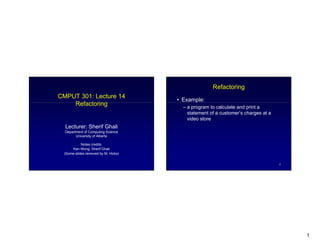
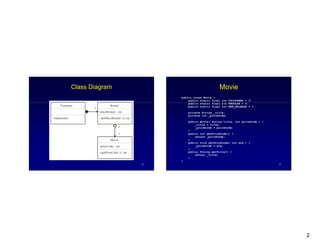
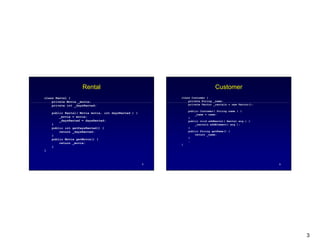
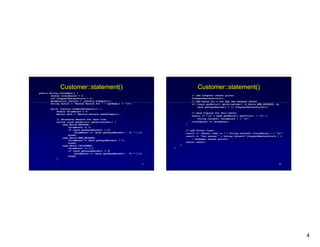
![5
9
Refactoring
:Customer :Rental :Movie
* [for all rentals]
getMovie ()
getPriceCode ()
getDaysRented ()
statement()
10
Refactoring
Something is rotten in the state of
Denmark
What is it?](https://image.slidesharecdn.com/refactoring-example-091014210810-phpapp02/85/Refactoring-Example-5-320.jpg)


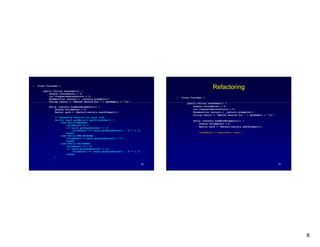















![24
47
Refactoring
-priceCode : int
Movie
Rental
-daysRented : int
+getCharge (): double
+getFrequentRenterPoints (): int
Customer
+statement()
-getTotalCharge (): double
-getTotalFrequentRenterPoints (): int
*
1
*
+getPriceCode (): int
+getDaysRented (): int
48
Refactoring
:Customer :Rental :Movie
getTotalCharge ()
getPriceCode ()
statement()
getTotalFrequentRenterPoints ()
* [for all rentals]
getCharge ()
* [for all rentals]
getFrequentRenterPoints () getPriceCode ()](https://image.slidesharecdn.com/refactoring-example-091014210810-phpapp02/85/Refactoring-Example-24-320.jpg)

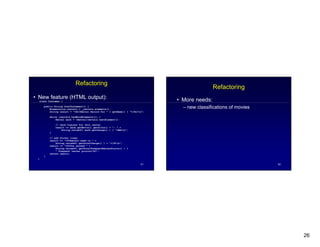



















![46
91
Rental
-daysRented: int
+getCharge(): double
+getFrequentRenterPoints(): int
Customer
+statement()
+getTotalCharge(): double
+getTotalFrequentRenterPoints(): int
+htmlStatement()
Price
Regular Price
+getCharge( days: int ): double
Childrens Price New Release Price
Movie
+getCharge( days: int ): double +getCharge( days: int ): double
+getCharge( days: int ): double
1*
+getCharge( days: int ): double
-price: Price
+getFrequentRenterPoints( days: int ): int +getFrequentRenterPoints( days: int ): int
+getFrequentRenterPoints( days: int ): int
+getDaysRented(): int
*
1
*
92
Refactoring
:Customer :Rental :Movie
getTotalCharge()
getCharge ( days )
statement
getTotalFrequentRenterPoints
* [for all rentals]
getCharge
* [for all rentals]
getFrequentRenterPoints getFrequentRenterPoints ( days )
:Price
getCharge ( days )
getFrequentRenterPoints ( days )](https://image.slidesharecdn.com/refactoring-example-091014210810-phpapp02/85/Refactoring-Example-46-320.jpg)







